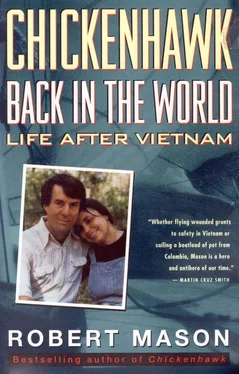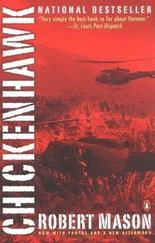Robert Mason - Chickenhawk - Back in the World - Life After Vietnam
Здесь есть возможность читать онлайн «Robert Mason - Chickenhawk - Back in the World - Life After Vietnam» весь текст электронной книги совершенно бесплатно (целиком полную версию без сокращений). В некоторых случаях можно слушать аудио, скачать через торрент в формате fb2 и присутствует краткое содержание. Год выпуска: 2013, Издательство: BookBaby, Жанр: Старинная литература, на английском языке. Описание произведения, (предисловие) а так же отзывы посетителей доступны на портале библиотеки ЛибКат.
- Название:Chickenhawk: Back in the World - Life After Vietnam
- Автор:
- Издательство:BookBaby
- Жанр:
- Год:2013
- ISBN:нет данных
- Рейтинг книги:3 / 5. Голосов: 1
-
Избранное:Добавить в избранное
- Отзывы:
-
Ваша оценка:
- 60
- 1
- 2
- 3
- 4
- 5
Chickenhawk: Back in the World - Life After Vietnam: краткое содержание, описание и аннотация
Предлагаем к чтению аннотацию, описание, краткое содержание или предисловие (зависит от того, что написал сам автор книги «Chickenhawk: Back in the World - Life After Vietnam»). Если вы не нашли необходимую информацию о книге — напишите в комментариях, мы постараемся отыскать её.
Chickenhawk: Back in the World - Life After Vietnam — читать онлайн бесплатно полную книгу (весь текст) целиком
Ниже представлен текст книги, разбитый по страницам. Система сохранения места последней прочитанной страницы, позволяет с удобством читать онлайн бесплатно книгу «Chickenhawk: Back in the World - Life After Vietnam», без необходимости каждый раз заново искать на чём Вы остановились. Поставьте закладку, и сможете в любой момент перейти на страницу, на которой закончили чтение.
Интервал:
Закладка:
The speaker blared: “The count is clear. The count is clear. Dorm Three may proceed to dinner.”
The doors burst open and I watched the men scramble out on the porch and onto the sidewalks. I’d read part of my Admissions and Orientation Guide already. You could not run anywhere in camp except the jogging trail. You had to stay on the sidewalks. The men walked in the hip-swiveling gait of professional speed walkers, arms swinging, racing to the mess hall. I vowed I would never rush to dinner. I’d prefer starving to letting these people see me that eager for their food.
John came into my section. “Wanna go check out the place before we eat?”
We walked along the sidewalks of the prison. The five dormitories were grouped irregularly in an immaculately groomed landscape. Dorm Three was the worst-looking building in the camp. The other four dorms were single-story concrete buildings that looked like college dorms. Everything was neat and tidy. The hedges were flat as tables. Sidewalks were edged. There were no weeds. The grass was cropped as smooth as a carpet. We came to a service road that led in from the base and formed the eastern boundary of the camp. The service road looped around the buildings in the camp and exited at the west side. We walked south along it. Inmate joggers and speed walkers passed us. Just past the last dormitory, Dorm Five, was a wooded area, and just beyond it was a finger of water from Choctawhatchee Bay that came into the camp. We veered off the service road, following a woodsy path down to the white sandy beach. The water was dark and uninviting. We walked along the beach until we saw a guy named Jeff who’d checked in when we did. He was standing on the beach, staring at the water.
“Nice beach,” I said.
“Yeah, better’n no beach. But I’m from the Virgins.”
John and I nodded. We, the three newbies, looked over at the long line of inmates in front of the mess hall which was right in front of Dorm Five.
“Just like the Army,” I said. “Find a line and stand in it.” Two guys walking the path together rushed past us.
“I hear there’s some asshole big-deal writer showing up today,” Jeff said.
I smiled. “He’s here,” I said.
“Really? Where?”
“There,” John said, pointing to me.
“Really?” Jeff said, grinning. “Sorry.”
“Hey,” I said. “You got the asshole part right. I didn’t get where I am today by being smart.” Jeff laughed. I noticed a Huey flying just over the trees behind him. I felt a pang of embarrassment, imagining the pilot seeing me.
We decided to go eat and continue our tour later.
The mess hall was designed to feed five hundred inmates, the maximum this camp was supposed to hold. The population when John and I arrived was about six hundred and fifty. The result at the mess hall was longer waits and earlier opening of the serving line. Some inmates ate dinner before the four o’clock count.
The long line of inmates that formed outside against two walls of the building, under a metal awning, divided into two lines inside. The place looked like any civilian cafeteria. You got a tray from a stack, silverware (actual metal, as opposed to the plastic variety used in higher-level prisons), and plates. The first serving table held salads on a bed of crushed ice—tossed, gelatin, fruit, five-bean, and so on. Yes, I am talking about a prison. You scooted your tray along the rails and handed your plate to the servers. Our first meal was thin-sliced roast beef, mashed potatoes, spinach, and squash. As you continued along the serving line, you got your choice of Coke, coffee, iced tea, or milk with unlimited refills. We carried trays to an empty table and sat down.
“How’d you get here?” I asked Jeff.
“Stupidity.”
“Like?”
“Oh, I got wooed, you know?”
“Screwed?” John said.
“Same thing,” Jeff said, laughing. “These guys said all I had to do was to go buy a brand-new yacht in my name, make one delivery with it, and the boat was mine to keep. I couldn’t pass up a deal like that. Naturally, I got busted. Guess who’s the registered owner of the boat? Guess who takes the major rap? Five years.’’
“Plus they took your boat,” John said.
Jeff nodded. “Plus they took my boat.”
“And you didn’t even get kissed,” I said, laughing. Jeff looked at me. I shrugged. “Sorry.”
We ate in a hurry. The food was okay, typical institutional fare. The problem with the mess hall was that it was pandemonium. The noise of two hundred men talking, laughing, clattering plates, clinking silverware, moving chairs, echoed and reverberated off the tile floors and concrete walls. You had to shout to be heard. John was sweating profusely, complaining how hot it was. It wasn’t hot. Every building in the camp, except Dorm Three, was air-conditioned.
Outside, we walked the rest of the jogging trail, a sandy path that ran along the boundary of the camp, beyond the dorms, and around a level grassy field big enough for a couple of football fields and a baseball diamond. We walked along the trail beside the western boundary of the camp, a white rope hung on short posts. Beyond the rope was a shallow ditch. Beyond the ditch was woods. To escape, just step over the rope.
The trail went past the weight shack, which was the busiest place in camp. Inside the open-walled building, thirty men lifted weights, punched punching bags, pedaled stationary bikes, and used all kinds of other exercise equipment. Around the weight shack were a couple of bocci lanes (at which four men on each lane rolled five-pound balls back and forth, seeing which team could get the most balls closest to the end of the lane); four tennis courts, which were always busy; and the softball field complete with bleachers—two sets of bleachers, one for inmates and one for the public. The prisoners were in the local softball league and played the Air Force units on the base. There was a baseball game going on as we walked by. We went past a low building that issued playing equipment, toward the administration building, back on the service road, completing one circuit of the jogging path.
The three of us stood at the entrance of the camp, staring at the white line painted across the road. Nobody said anything. That white line was the barrier. The physical thing that kept us here was a white line, painted over many times until it was as thick as two playing cards.
It seemed absurd that this system worked, but it did. The kind of prisoners sent here were just the kind who’d stay behind a white line if you told them to. You could not be sent to Eglin, or any of the other twenty or so camps in the United States like Eglin, if you were guilty of a violent crime, if weapons were used in the commission of your crime, or if your crime was a sex crime. Minimum-security camps were originally built to incarcerate white-collar criminals. Robert Haldeman of the Watergate era was sent here. The governor of Maryland was here the year before. Several wealthy businessmen were here now. Times change. Now the population was swelled by drug smugglers like us. Roughly seventy percent of the prisoners here were in for drug-related crimes, the rest were in for tax evasion or stock manipulation or union violations, or even any of several federal misdemeanors that can send you to prison. The white line worked because, if you stepped over it, you were guilty of escape and would be sent to a level two (or higher) prison, where they have actual, physical boundaries.
Floodlights atop tall poles flicked on, hazy cones surrounded by dusk. We continued down the service road and walked through the recreation room (pool and table tennis), the library (a living-room-sized place with few books), and the craft shop, which had a complete collection of woodworking equipment. We saw a big line of people going into a building next to the craft shop. We walked up to the door and saw that it was the camp commissary.
Читать дальшеИнтервал:
Закладка:
Похожие книги на «Chickenhawk: Back in the World - Life After Vietnam»
Представляем Вашему вниманию похожие книги на «Chickenhawk: Back in the World - Life After Vietnam» списком для выбора. Мы отобрали схожую по названию и смыслу литературу в надежде предоставить читателям больше вариантов отыскать новые, интересные, ещё непрочитанные произведения.
Обсуждение, отзывы о книге «Chickenhawk: Back in the World - Life After Vietnam» и просто собственные мнения читателей. Оставьте ваши комментарии, напишите, что Вы думаете о произведении, его смысле или главных героях. Укажите что конкретно понравилось, а что нет, и почему Вы так считаете.












